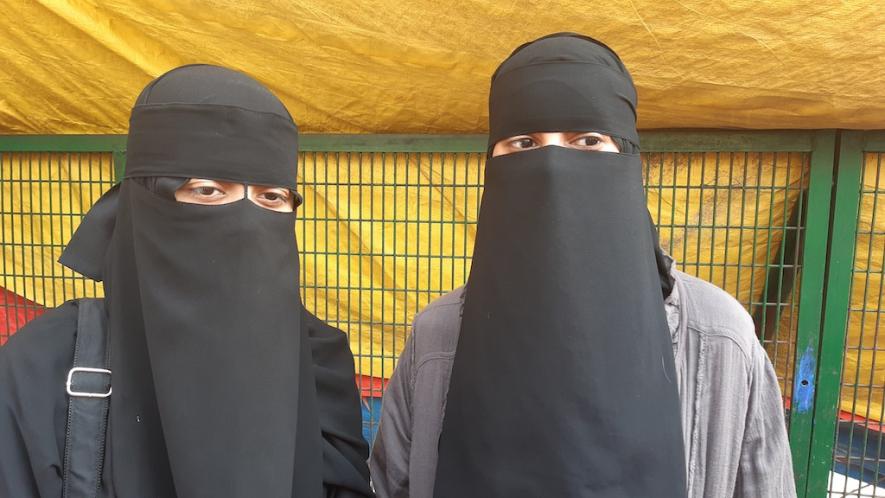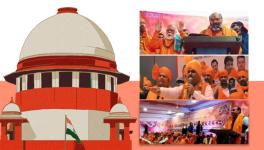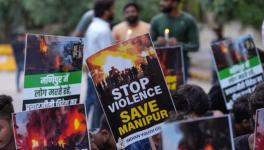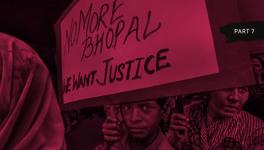SC-Appointed Mediators Praise ‘Articulate’ Protesters of Shaheen Bagh

New Delhi: With tears in their eyes and firm conviction, Shaheen Bagh women—who have been protesting against the controversial Citizenship (Amendment) Act (CAA), the notified National Population Register (NPR) and the proposed National Register of Indian Citizens (NRIC) for the past 68 days at Road Number 13A—poured their hearts out when the Supreme Court-appointed interlocutors on February 19 reached out to them with an aim to find a solution to the road blockade.
Among them were two young women—Fatima and Zainab—who grabbed the attention of the mediators (senior advocates Sanjay Hegde and Sadhana Ramachandran).
As the interlocutors entered the main tent and took the podium amid loud cheers, furious claps and standing ovation by the protestors, Fatima (in her late 20s), who divides her time between family, her studies and the protest, broke down. “Finally, someone came to listen to us,” she said.
“This protest has given me practical lessons of life—how to be defiant with love. We are extremely grateful to the Supreme Court, which recognised our right to protest and acknowledged the need to listen to our woes. We welcome the grand gesture of the highest temple of justice,” she said.
Hegde and Ramachandran then explained to the demonstrators the purpose of the panel’s visit to Shaheen Bagh. “The Supreme Court has upheld your right to protest. But fellow citizens have also their rights and those should also be maintained,” said Ramachandran while explaining the apex court’s December 17 order first read out by Hegde in English.
She continued, “We will find a resolution, which will set an example that will be remembered not only in India but the entire world. We have come here to listen to you.”
When her turn came, Fatima held the microphone and told the panel, “We are here to speak to you as Muslims who have been born and brought up in India, whose forefathers sacrificed their lives for this soil and had rejected the idea of Pakistan. How dare anyone question our identity?”
She continued with her voice chocking, “Is desh ki mahilayen do mahine is sadak pe baithi rahin aur koi nahin aaya unhen sunne… Media ne kya kiya hamare saath… Media ne kaha hum terrorists hain, hum anti-national hain, hum biryani khane ke liye yahan baithe hain… Hum zinda hain… Agar aap chahte hain ki hum apni awaz na uthayen to de dijiye hamen euthanasia ki ijazat… Kar den hamen khatam… Hum suicide nahin kar sakte kyunki suicide hamare mazhab men allowed nahin hai (Women of this country kept sitting on this road for two months and nobody came to listen to them… What did the media say about us? They called us terrorists, anti-national… They said we have been sitting here to eat biryani (a delicacy)… We are alive… If you don’t want us to raise our voice, give us the permission for euthanasia (mercy killing)… Kill us all… We cannot commit suicide as it is not permitted in our religion).”
“The inconvenience theory is being purposely blown out of proportion to create a false narrative against us. The government has forced us to come out on the streets by bringing in a divisive act. Inconvenience kya sirf un logon ki hai jo traffic jam mein phans rahe hain… kya humlog, budhe, bachche jo yahan baithe hue hain unki inconvenience matter nahin karti…? Yeh narrative sirf isliye create kiya ja raha hai ki hum protest khatam kar den… Aap kah rahe hain ki hum apna protest kahin aur shift kar den, jab hamari baat yahan koi nahin sun raha to wahan kaun sunega? Shaheen Bagh ki tarz par pure desh men mein kayi protests ho rahe hain… Agar hum ise khatm kar den to iska asar un sare protest par padega...aur hum ise afford nahin kar sakte (Are only those who get stuck in traffic jams facing inconvenience? Does our inconvenience not matter? This narrative is being created with the only aim that we end our protest. You are suggesting we shift the protest venue. When no one is listening to us here, who will care if we shift our protest venue? Shaheen Bagh is the epicentre of the nationwide protests against the CAA… If we call off the protest here, it will impact protests across the country and we cannot afford it). We have been sitting here on the streets for the past two months to save that one Constitution, which is dear to us more than anything. Does the government want to take that right from us too?” she questioned.
“Logon ko inconvenience ho rahi hai, hum isko maante hain… Hamen bhi bahut inconvenience ho rahi hai aur ise bhi samajhna hoga… Lekin baat jab Gandhi, Bhagat Singh aur secularism ke values ko bachane ki ho to hamen sadkon pe aana hoga aur hum aa chuke hain… Government ko hamari aur unlogon ki jinhen traffic inconvenience ho rahi hai sabhi ki problem samajhna chahiye (When the ideas of Gandhi, Bhagat Singh and secularism are at stake, we will have to take to the streets and we have done that. The government must acknowledge the inconvenience faced by us and the commuters as well),” said Fatima.
Taking objection to Union Home Minister Amit Shah’s remarks that the government will not move even an inch on CAA, she concluded, “Aap kaise nahin piche hatenge…? Bahut shukriya court ka uunhone unhen bata diya ki ek inch piche nahin hatne waali language nahin chalegi (How can you (the government) not move even an inch…? Many thanks to the court, which told them that this language will not work). Democracies cannot run on the ‘my way or the highway’ principle. The constitution of the mediation team have at least sent a message to Amit Shah that problems can only be resolved through dialogue. This has strengthened out trust and confidence in the democracy).”
Praising Fatima for her eloquence, Hegde said, “I am very impressed not because you speak very well, but because of your confidence in institutions and democracy. I too have kids like you. Though they study in big law schools, yet they are not articulate like you. I want to tell you ‘liberty lies in the hearts of men and women’. Till the time our country has daughters like you who are safeguarding the Constitution, India will never cease to be free.”
Addressing the mediators, another young woman—Zainab— sought to know why she and the fellow protesters are being called terrorists just because they dress differently. “The government has constantly run a vilification campaign against us through speeches and their media mouthpieces. They have constantly ‘othered’ us because of our clothes, our food. Just because I am dressed differently, am I a terrorist?” she asked.
“We have been ‘othered’ so much that the government does not even think that they can come and talk to us. The Supreme Court has to sent someone to listen to our problems. You have forced us to come out on the streets by bringing in a divisive act. Don’t you care about our inconvenience?”
She continued, “We are deeply disturbed. We cannot sleep properly. I have exams to write, but I am unable to concentrate on preparations. Sir, the government’s decisions are taking a toll on us. We are uncertain about our future. We are facing an existential crisis. We are also concerned about our poor countrymen who will not be able to prove their citizenship. The government says that we need not worry but the Assam model is before us. People are being lodged in detention centres. When a child died of cold because his mother used to bring him to the protests, the Supreme Court took suo-moto cognisance. We appreciate it. We also expect the top court to think about the children who have died in detention centres in Assam.”
As she concluded, Ramachandran reiterated, “Till the time the country has articulate daughters like you, there is no threat to the country.”
On February 17, the Supreme Court had observed that the blockade of the road at Shaheen Bagh was “troubling” and suggested that the protesters go to another site where no public place would be blocked. It, however, upheld their right to protest.
The apex court also asked Hegde to “play a constructive role as an interlocutor” to persuade the protesters to move to an alternative site. It said the interlocutors could seek assistance from former CIC Wajahat Habibullah.
The sit-in, which has been going on since December 15, 2019 has blocked a critical arterial road connecting Delhi, Noida and Faridabad, causing trouble to commuters.
After the mediation team listened to the protesters for around two hours, they said they met a whole lot of proud Indians. They also said it was a fruitful meeting.
“We have had a very fruitful first meeting with the protesters at Shaheen Bagh today. We met a whole lot of very proud Indians who have great confidence in their Constitutional institutions. There was great appreciation of the Supreme Court and it’s an important belief in democratic dialogue,” said Ramachandran.
She further added, “It is very important for aggrieved parties to be heard is how we saw it and everyone expressed their confidence as joint co-citizens of this country that together we can find a feasible solution. Mutual appreciation and respect of everyone’s rights is the only way forward in this country and we both remain extremely hopeful of a good resolution.”
Also read: We Are Facing Fear of Disenfranchisement, Won’t Move Half an Inch: Shaheen Bagh to Mediators
Get the latest reports & analysis with people's perspective on Protests, movements & deep analytical videos, discussions of the current affairs in your Telegram app. Subscribe to NewsClick's Telegram channel & get Real-Time updates on stories, as they get published on our website.
























